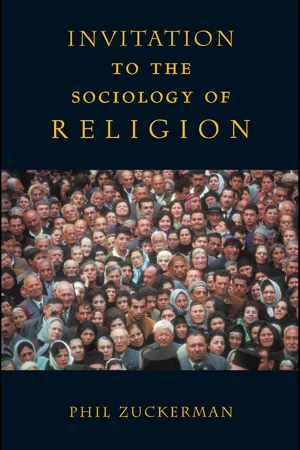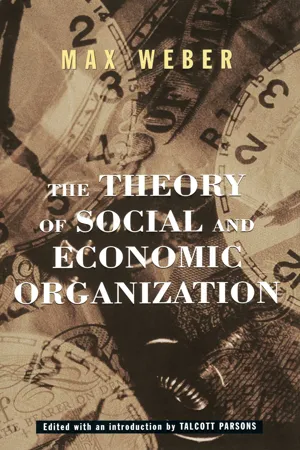Social Sciences
Sociology as a Science
Sociology as a science refers to the systematic study of society, human behavior, and social interactions using empirical evidence and scientific methods. It aims to understand and explain social phenomena, patterns, and structures through observation, experimentation, and analysis. By applying scientific principles to the study of human society, sociology seeks to uncover underlying social processes and contribute to our understanding of the social world.
Written by Perlego with AI-assistance
Related key terms
6 Key excerpts on "Sociology as a Science"
- eBook - ePub
- William Egelman(Author)
- 2012(Publication Date)
- Research & Education Association(Publisher)
The sociological imagination expresses both an understanding that personal troubles can and often do reflect broader social issues and problems and also faith in the capacity of human beings to alter the course of human history. The sociological imagination, therefore, expresses the humanistic aspect of the sociological perspective.THE SCIENCE OF SOCIOLOGYAs in all other sciences, the sociologist assumes there is “order” in the universe and that with methods of science the order can be understood. The sociologist, however, cannot assume that human beings will always behave in predictable ways. There are times when we do and times when we don’t.Although most of us will think and act tomorrow as we did today, some of us won’t. Unlike the rocks and molecules studied by natural scientists, we are capable of changing our minds and our behavior. Unlike the organisms studied by biologists, we are capable of treating each other as whole and complete beings. Hence, the explanations and predictions offered by sociology cannot be so precise as to express universal laws that are applicable to any thing or event under all circumstances.The Social SciencesThe social sciences are concerned with social life—psychology, with its emphasis on individual behavior and mental processes; economics, with its emphasis on the production, distribution, and consumption of goods and services; political science, with its emphasis on political philosophy and forms of government; and anthropology, with its current emphasis on both primitive and modern culture. What then distinguishes sociology from these other social sciences? In sociology the “social,” however it is defined, is the immediate concern.THE ORIGINS OF SOCIOLOGYCompared to other academic disciplines (e.g., history, economics, and physics in particular), sociology is a discipline still in its prime. It was in 1838 that Auguste Comte coined the term from socius (the Latin word for “companion, with others”) and logos - eBook - ePub
- Steve Chapman, Patrick McNeill, Patrick Mcneill(Authors)
- 2005(Publication Date)
- Routledge(Publisher)
1 Research methods in sociology‘What is sociology about?’ is probably the question that sociologists are asked more often than any other. A reasonable reply might be that sociologists are interested in those aspects of human behaviour which are the result of the social context in which we live. They do not concentrate on features which are the result of our physical or biological makeup. Sociology stresses the patterns and the regularities of social life which are, most of the time, orderly and largely predictable.The next question is then, typically, ‘But what do you actually do?’ and it is to this question that this book is addressed. While there is, as you may know, considerable variation and disagreement among sociologists, they are united in the conviction that argument that is based on sound evidence is superior to argument based on false evidence, limited evidence, or no evidence. Evidence has to be collected from the social world around us, and this requires empirical research to be done. ‘Empirical’, in this context, simply means ‘based on evidence from the real world’ in contrast to ‘theoretical’, which refers to ideas that are abstract or purely analytical. Theories must be tested against the real world, ‘Theory, in fact, is the building which is made from the hard-won bricks of research studies’ (Mann 1985). This still leaves open the question of what counts as sound evidence, and this in turn leads to a central theme of this book: ‘How can we collect sound evidence about the social world that can be used to increase our understanding of that world?’Over the years, sociologists have used a wide variety of methods of data collection and analysis. They have studied an even wider variety of aspects of social life, from such matters as how people avoid bumping into each other in the street to topics as wide-ranging as the causes of the rise of capitalism. In fact, a brief history of sociology since the end of the last century is an effective way of introducing the variety of research styles and some of the topics studied. - eBook - ePub
- Phil Zuckerman(Author)
- 2010(Publication Date)
- Routledge(Publisher)
sociology —and then proceed to illustrate how it applies to the second part, religion. Of course, to briefly summarize sociology is no easy task. Every individual sociologist has his or her unique understanding of the discipline, and there will undoubtedly be those who find my attempt to describe sociology lacking. Nevertheless, here I go.Sociologists, in the words of Peter Berger (1963, 18), are “intensively, endlessly, shamelessly” interested in humans. From the behavior of people in elevators to the racing of llamas, from beer drinking to breast implanting, from race relations to rug making—if it involves humans, sociologists are interested. Sociology is distinguished both by its subject matter (what sociologists actually study) and by its particular orientation/perspective (how sociologists look at the world).Here then are my “top ten” components of sociology.1. Sociologists study social groups .
Street gangs and student movements, baseball teams and Boy Scouts, lesbians and libertarians, marines and Mothers Against Drunk Driving, the Ku Klux Klan, the Black Panthers, animal rights activists, taxidermists—in short—any association of people you can think of, a sociologist has been, is, or will be studying it.2. Sociologists study social interaction .
Have you ever been standing with a friend on a street corner, having a great conversation, when suddenly a third person joins you— notice how the dynamic suddenly changes? Have you ever noticed that your boyfriend or girlfriend acts differently when he or she is with you alone than when his or her friends are around? These are just a couple of examples of the kinds of things “micro” sociologists study: how people interact with one another, how people present themselves to one another, how people’s very identities change given various social contexts, circumstances, and forms of interaction (Simmel 1950; Goffman 1959; Garfinkel 1967).3. Sociologists study social institutions and social structures .
Schools. The military. Corporations. Police departments. City hall. The government. Hospitals. Prisons. The family. Courts. Marriage. Industries. The media. Sports. The economy. Political systems. The workplace. The welfare system. And a whole lot more. Sociologists look at the ways certain social structures and institutions frame and shape our lives, greatly affecting where we live, how we live, who we live with—even how long we live. - eBook - ePub
- Hans Van Ewijk(Author)
- 2017(Publication Date)
- Routledge(Publisher)
Epistemology asks what kind of knowledge we are aiming to generate, if and how we are able to know facts and features about the physical, biological and social world, and under what conditions is our knowledge valid. An important question in this regard is if generating knowledge about material organisms and constructs – such as society, community and organisations – is more or less dependent on similar epistemologies, or if learning to know the physical world is essentially different from learning to know the social world. It is generally accepted that different disciplines are based on different epistemologies. The claim made by the new social work definition that social work is a discipline on its own suggests (the need for) an underlying social work epistemology. Before taking a stand in this debate, however, we should deal with the questions what is science and which characteristic dichotomies does it bring into the picture? There is no definitive answer to the question what a science is and isn’t. The discourse on science is a Bourdieu-like field with permanent interaction and change, where a few actors hold dominating positions in a specific period and specific place. Actors in dominating positions perhaps have a stronger inclination to claim a paradigmatic position; in our times this paradigm is rather disciplinary and positivistic in nature. Let me quote Brekke’s definition of science here to further the discussion: ‘A science is a combination of theory and systematic empirical method, rooted in ontological and epistemological context, and applied to a defined set of phenomena’ (2012, p.456).In this definition we find some basic keywords. The first of these is theory . A theory is needed to understand and explain, and usually also to steer, research. This also implies that theories can hinder or even mislead researchers in their observations. For this reason, some scientists make the case for researching in the absence of a priori theoretical frameworks. They assume that theory, in effect, stems from practice and data (Glaser & Strauss, 1967). The second keyword in the definition above is systematic empirical method , which is more or less similar to the word research - eBook - ePub
In Defence of Sociology
Essays, Interpretations and Rejoinders
- Anthony Giddens(Author)
- 2013(Publication Date)
- Polity(Publisher)
THREE What is Social Science?We can distinguish three main characteristics of mainstream social science, or what I have sometimes called the ‘orthodox consensus’. These views have been pre-eminent in sociology for much of the postwar period, but I think it would be true to say that they have stretched across a wide range of other social sciences as well.The first is naturalism, the notion that the social sciences should be modelled after the natural sciences and that the logical framework of social science addresses problems similar to those of natural science. I prefer the term ‘naturalism’ to ‘positivism’, although they mean much the same thing.The second feature of the orthodox model is the idea that when we explain human activity, we should do so in terms of some sort of conception of social causation. That is to say, although as human agents we might seem to know a good deal about what we are doing and about why we act as we do, the social scientist is able to show that really we are moved by causes of which we are unaware. The role of social sciences is to uncover forms of social causation of which actors are ignorant.A third element (about which I shall not say much in this discussion) associated with the model is functionalism. Although it has been generally held that the social sciences should be like natural sciences, most have accepted that they cannot be too much like classical physics because social scientists deal with systems; and systems resemble biological wholes more than the phenomena which concern physicists. Notions of systems supposedly derived from biology, often modelled as well upon cybernetics, were assumed by many sociologists to be central to social analysis.The orthodox consensus is today a consensus no more. It used to be a majority position in social science, but now has become a minority one (certainly in the area of social theory, perhaps not so much in empirical social research). Those who would now defend such a standpoint represent only one among a diverse range of perspectives. In its place stands a plurality of different theoretical perspectives – such as ethnomethodology, various forms of symbolic interactionism and neo-Weberianism, phenomenology, structuralism, hermeneutics and critical theory – the list seems almost endless. - eBook - ePub
- Max Weber(Author)
- 2009(Publication Date)
- Free Press(Publisher)
As regards content, reference may be made especially to the fine work of Ferdinand Tönnies, Gemeinschaft und Gesellschaft, and also to the gravely misleading book of Rudolph Stammler, Wirtschaft und Recht, which may be compared with my criticism in the Archiv für Sozialwisscnschaft (vol. xxiv, 1907). This critical essay contains many of the fundamental ideas of the following exposition. The present work departs from Simmel’s method (in the Soziologie and the Philosophie des Geldes) in drawing a sharp distinction between subjectively intended and objectively valid ‘meanings’; two different things which Simmel not only fails to distinguish but often deliberately treats as belonging together. 1: T HE D EFINITIONS OF S OCIOLOGY AND OF S OCIAL A CTION I. Sociology (in the sense in which this highly ambiguous word is used here) is a science which attempts the interpretive understanding of social action in order thereby to arrive at a causal explanation of its course and effects. In ‘action’ is included all human behaviour when and in so far as the acting individual attaches a subjective meaning to it. Action in this sense may be either overt or purely inward or subjective; it may consist of positive intervention in a situation, or of deliberately refraining from such intervention or passively acquiescing in the situation. Action is social in so far as, by virtue of the subjective meaning attached to it by the acting individual (or individuals), it takes account of the behaviour of others and is thereby oriented in its course. 3 (a) The Methodological Foundations of Sociology 4 1. ‘Meaning’ may be of two kinds. The term may refer first to the actual existing meaning in the given concrete case of a particular actor, or to the average or approximate meaning attributable to a given plurality of actors; or secondly to the theoretically conceived pure type 5 of subjective meaning attributed to the hypothetical actor or actors in a given type of action
Learn about this page
Index pages curate the most relevant extracts from our library of academic textbooks. They’ve been created using an in-house natural language model (NLM), each adding context and meaning to key research topics.





